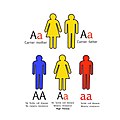Overdominance
Overdominance is a genetic phenomenon that occurs when a heterozygous individual (having two different alleles at a particular gene locus) exhibits a phenotype that is more pronounced or advantageous than that of either homozygous individual (having two identical alleles at a particular gene locus). This phenomenon is also known as heterozygote advantage or heterosis.
In the context of genetics, overdominance is often observed in cases where the heterozygous genotype confers a selective advantage in terms of fitness or survival compared to the two homozygous genotypes. This can result in the maintenance of genetic diversity within a population, as both alleles are maintained at relatively high frequencies due to the selective advantage of the heterozygous genotype.
One classic example of overdominance is sickle cell anemia, a genetic disorder caused by a mutation in the hemoglobin gene. Individuals who are homozygous for the sickle cell allele have sickle cell disease, which can lead to serious health complications. However, individuals who are heterozygous for the sickle cell allele (carriers) have a selective advantage in regions where malaria is prevalent, as they are less susceptible to the disease. This results in the maintenance of both the normal and sickle cell alleles in the population.
Another example of overdominance is the major histocompatibility complex (MHC) genes in vertebrates. The MHC genes encode proteins that play a crucial role in the immune response by presenting antigens to T cells. Heterozygous individuals with a diverse set of MHC alleles are better able to recognize and respond to a wide range of pathogens, providing them with a selective advantage in terms of immune defense.
In agricultural genetics, overdominance is exploited in breeding programs to produce hybrid crops with superior traits such as increased yield, disease resistance, or stress tolerance. By crossing two genetically distinct parental lines, breeders can take advantage of the heterosis effect to create hybrids that outperform their parents in terms of productivity and resilience.
Overall, overdominance is a fascinating genetic phenomenon that highlights the importance of genetic diversity in populations and the complex interactions between alleles in determining phenotypic outcomes.
Ad. Transform your life with W8MD's Budget GLP-1 injections from $75


W8MD offers a medical weight loss program to lose weight in Philadelphia. Our physician-supervised medical weight loss provides:
- Weight loss injections in NYC (generic and brand names):
- Zepbound / Mounjaro, Wegovy / Ozempic, Saxenda
- Most insurances accepted or discounted self-pay rates. We will obtain insurance prior authorizations if needed.
- Generic GLP1 weight loss injections from $75 for the starting dose.
- Also offer prescription weight loss medications including Phentermine, Qsymia, Diethylpropion, Contrave etc.
NYC weight loss doctor appointmentsNYC weight loss doctor appointments
Start your NYC weight loss journey today at our NYC medical weight loss and Philadelphia medical weight loss clinics.
- Call 718-946-5500 to lose weight in NYC or for medical weight loss in Philadelphia 215-676-2334.
- Tags:NYC medical weight loss, Philadelphia lose weight Zepbound NYC, Budget GLP1 weight loss injections, Wegovy Philadelphia, Wegovy NYC, Philadelphia medical weight loss, Brookly weight loss and Wegovy NYC
|
WikiMD's Wellness Encyclopedia |
| Let Food Be Thy Medicine Medicine Thy Food - Hippocrates |
Medical Disclaimer: WikiMD is not a substitute for professional medical advice. The information on WikiMD is provided as an information resource only, may be incorrect, outdated or misleading, and is not to be used or relied on for any diagnostic or treatment purposes. Please consult your health care provider before making any healthcare decisions or for guidance about a specific medical condition. WikiMD expressly disclaims responsibility, and shall have no liability, for any damages, loss, injury, or liability whatsoever suffered as a result of your reliance on the information contained in this site. By visiting this site you agree to the foregoing terms and conditions, which may from time to time be changed or supplemented by WikiMD. If you do not agree to the foregoing terms and conditions, you should not enter or use this site. See full disclaimer.
Credits:Most images are courtesy of Wikimedia commons, and templates, categories Wikipedia, licensed under CC BY SA or similar.
Translate this page: - East Asian
中文,
日本,
한국어,
South Asian
हिन्दी,
தமிழ்,
తెలుగు,
Urdu,
ಕನ್ನಡ,
Southeast Asian
Indonesian,
Vietnamese,
Thai,
မြန်မာဘာသာ,
বাংলা
European
español,
Deutsch,
français,
Greek,
português do Brasil,
polski,
română,
русский,
Nederlands,
norsk,
svenska,
suomi,
Italian
Middle Eastern & African
عربى,
Turkish,
Persian,
Hebrew,
Afrikaans,
isiZulu,
Kiswahili,
Other
Bulgarian,
Hungarian,
Czech,
Swedish,
മലയാളം,
मराठी,
ਪੰਜਾਬੀ,
ગુજરાતી,
Portuguese,
Ukrainian

